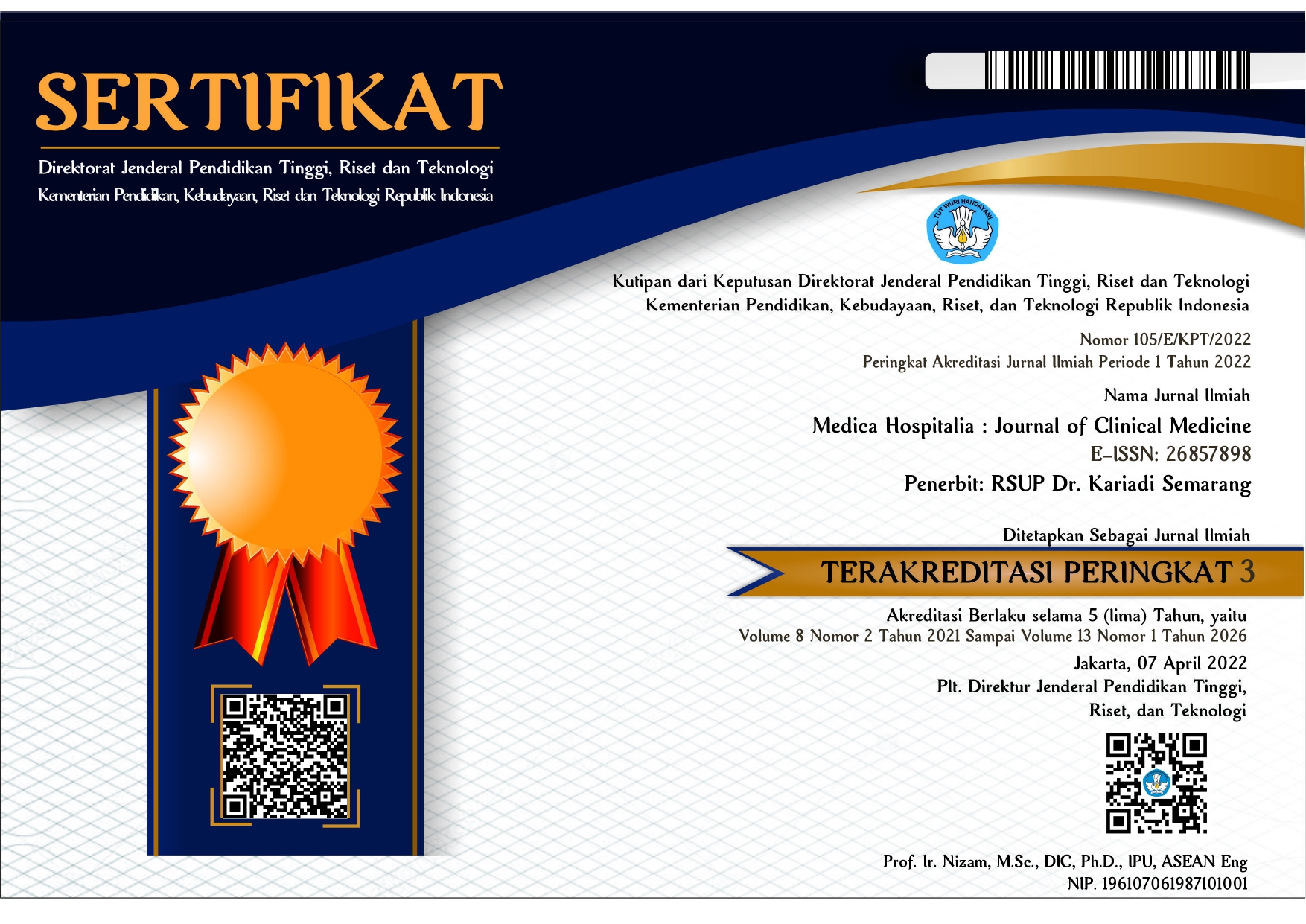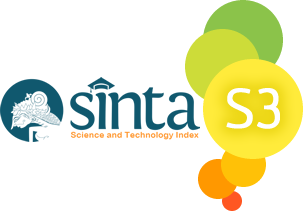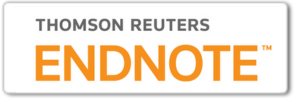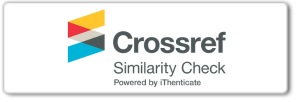Publication Ethics
Medica Hospitalia: Journal of Clinical Medicine is a scientific journal published by RSUP Dr Kariadi and accepts scientific articles written in both Indonesian and English regarding to clinical-based medical/health-related aspects particularly hospitals. Articles are in the forms of original article (primary research) or case report based on evidence. The research scope involves medicine, nursing, and other health allied such as pharmacy, radiology, medical rehabilitation, nutrition, sterilization etc. Medica Hospitalia: Journal of Clinical Medicine publishes periodically three times a year
Publication in scientific journal is an important part of knowledge advancement particularly in medical and health science. Publication is a reflection of author’s article and institution quality. Research-based articles or evidence-based case reports advance medical and health allied science which is patient safety oriented. For that reason, ethical standard is needed for all parties involved in publications such as editors, reviewers and authors
ETHICAL STANDAR FOR EDITOR
- Decision for publications
Editors of Medica Hospitalia: Journal of Clinical Medicine are responsible to make decision for publication. This decision is based on article validation and its contribution to authors and readers. Editors are guided by editorial board provision and comply with law such as defamation, copyright infringement, and plagiarism. Editors may discuss with other editors or reviewers during decision making process.
- Objective appraisal
Editors evaluate manuscripts based on intellectual contents without discrimination of religion, ethnicity, tribe, gender, nationality etc.
- Confidentiality
Editors and editorial staffs should not reveal any information regarding to submitted manuscript to any party other than authors, reviewers, reviewer candidates, and editorial board.
- Conflict of interest
Article materials already submitted to Medica Hospitalia: Journal of Clinical Medicine and having not been published should not be used for personal research by editors without written permission from the authors. Idea or information gathered from the articles should be kept confidential and are not exploited for personal interest. Editors should refuse article review in case of conflict of interest caused by competitive, collaborative relations or other relations with authors, companies or institutions related to the manuscript.
- Cooperation for investigation
Editors should take responsive action when ethical issues of the submitted manuscript or published articles are reported. Editors may contact authors and consider these issues. Editors may further communicate with institutions or relevant research bodies. When issues have been resolved, publication of revision, withdrawal, statement of concern or other notes need to be considered.
ETHICAL STANDARD FOR REVIEWER
- Contributions toward editorial decisions
Reviewers help editors to make decision and authors to improve manuscript through editorial communication between reviewers and authors. Peer review is an important component of a formal scholarly communication and scientific approach.
- Punctuality
When the assigned reviewers feel unqualified for reviewing a manuscript or unable to complete review in a timely fashion, they should immediately notify editors.
- Confidentiality
Each manuscript submitted for review should be handled as a confidential document. The manuscript should not be shown to or discussed with others unless authorized by editors.
- Objectivity
Review should be conducted objectively. Personal criticism to authors is improper. Reviewer should clearly deliver their view along with supporting argument.
- Completeness and originality of references
Reviewers should identify published articles have not been quoted by authors. A statement of previously published observation or argument should be accompanied with relevant quotation. Reviewers should notify editors for substantial similarity between the reviewed manuscripts and other published articles according to reviewer’s knowledge.
- Conflict of interest
Unpublished article materials should not be used for reviewer’s personal research without providing written permission from the authors. Idea or information gathered from peer review process should be kept confidential and not be exploited for personal interest. Reviewers should refuse article review in case of conflict of interest caused by competitive, collaborative relations or other relations with authors, companies or institutions related to the manuscript.
ETHICAL STANDAR FOR AUTHORS
- Writing standard
Authors should accurately present articles based on research having been conducted and provide objective discussion of the research significance. Research data should be accurately presented in the articles. Articles should be detailed along with adequate references enabling replication by others. Fabrication or inaccurate presentation is an ethical misconduct and unacceptable.
- Access of research data
Authors may be asked to provide manuscript-related raw data and allow public access if necessary and store it in fair period after publication.
- Originality and plagiarism
Plagiarism is a form of ethical misconduct in publication of scientific works and unacceptable. Authors should ensure all scientific works presented are original and properly cite other works and/or excerpts. There are several forms of plagiarism such as claiming other works as his/her own, copying or re-writing substantial works of others without citation, and claiming research findings conducted by others. Self-plagiarism or oto plagiarism is a form of plagiarism. Oto plagiarism is quoting research findings or excerpt of his/her own published work without citing the sources.
- Provision of manuscript submission
Authors should not publish same article in more than one journal. Submitting same article in more than one journal is an ethical misconduct in publication of scientific works and unacceptable.
- Citation of references
Proper acknowledgement of other works should always be conducted. Authors should mention published articles influencing his/her works. Information gathered in personal, such during conversation, correspondence or discussion with third party, should never be used or reported without written permission from the sources of information.
- Authorship
Authors are those giving significant contribution of the concept, design, execution or interpretation of excerpt in the articles. All parties already giving significant contribution are included as co-author. The writers of correspondence ensure all co-authors are already included in the manuscript, and all co-authors have read and approved the final work and submission for publication.
- Fallaciousness in published excerpts
When authors find significant fallaciousness or inaccuracy in their published work, they should immediately notify editors and cooperate with editors for withdrawal or revision. If editors are notified by third parties regarding significant fallaciousness of published works, authors should withdraw or rectify their manuscript or provide evidence to editors regarding the accurate version.
























